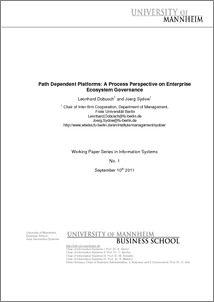|
Path Dependent Platforms : A Process Perspective on Enterprise Ecosystem Governance
Dobusch, Leonhard
;
Sydow, Jörg
![[img]](https://madoc.bib.uni-mannheim.de/style/images/fileicons/application_pdf.png)  Vorschau |
|
PDF
WPSIES_Path_Dependent_Platforms.pdf
- Veröffentlichte Version
Download (355kB)
|
|
URL:
|
https://ub-madoc.bib.uni-mannheim.de/29107
|
|
URN:
|
urn:nbn:de:bsz:180-madoc-291075
|
|
Dokumenttyp:
|
Arbeitspapier
|
|
Erscheinungsjahr:
|
2011
|
|
Titel einer Zeitschrift oder einer Reihe:
|
Working Paper Series in Information Systems
|
|
Band/Volume:
|
001
|
|
Ort der Veröffentlichung:
|
Mannheim
|
|
Sprache der Veröffentlichung:
|
Englisch
|
|
Einrichtung:
|
Außerfakultäre Einrichtungen > Institut für Enterprise Systems (InES)
Fakultät für Betriebswirtschaftslehre > Wirtschaftsinformatik IV (Mädche 2009-2015)
|
|
MADOC-Schriftenreihe:
|
Area Information Systems and Institute for Enterprise Systems > Working Paper Series in Information Systems
|
|
Fachgebiet:
|
650 Management
|
|
Fachklassifikation:
|
JEL:
M15,
|
|
Freie Schlagwörter (Englisch):
|
platform , path dependence , management , governance
|
|
Abstract:
|
In their editorial to the workshop on the role of platforms for enterprise ecosystems, Beimborn et al. (2011: 4) emphasize that “the emergence of platforms as backbones for inter-organizational cooperation and collaboration also impacts the way economic activity is organized.” In a similar vein, Tiwana et al. (2010: 686) argue that platform-based enterprise ecosystems actually constitute “complex alliance networks”, where an approach grounded in literature on inter-organizational relationships might be a helpful complement to “the burgeoning exclusively macro, two-sided markets literature in economics.”
Conceptualizing the relationships between platform and module providers as historically contingent, inter-organizational processes exhibits both new explanatory potentials and methodological difficulties. Scholars in the tradition of the two-sided markets paradigm such as Economides and Katsamakas (2006) ask how collaborative or competitive the relationship between platform leader and providers of complementary goods should be. In contrast, focusing on inter-organizational relations (e.g., Dyer and Singh 1998) would acknowledge that such a question cannot be decided in the abstract but rather depends, among others, on a platform’s governance history and expected future.
Coming from such an organization-theory perspective, it might sound odd to combine such an approach with insights from path dependence theory, which again roots in works by the economists David (1985) and Arthur (1989). The reason for this choice is threefold: first, while we do want to strengthen the role of managerial contingency in platform governance, we want to warn against overstating managerial leeway too. Second, as pointed out by Langlois (2002: 25), modular innovation promoted by platforms might come at the cost of increasing costs of systemic innovation. Third, recent applications of path dependence theory in an organizational realm (see, for example, Sydow et al. 2009; Dobusch 2010) sensitize for rigidities or even lock-ins in particular, which may result from initially successful governance practices. All these points taken together imply following the recommendation by Tiwana et al. (2010: 685) to “explicitly consider the possibility of nonlinear and threshold effects.”
|
 | Das Dokument wird vom Publikationsserver der Universitätsbibliothek Mannheim bereitgestellt. |
 Suche Autoren in Suche Autoren in
Sie haben einen Fehler gefunden? Teilen Sie uns Ihren Korrekturwunsch bitte hier mit: E-Mail
Actions (login required)
 |
Eintrag anzeigen |
|
|
